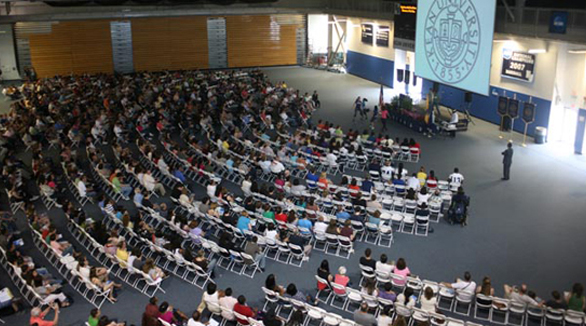Undecided about your major?
There are students who know exactly what they want to study in college and what their career goal is. However, despite what you may hear from friends or family, many students do not know what major they want. Even 50% those who have selected a major end up changing their major; some students even do so two or three times.
Many colleges offer the option to enter the college as an "Undecided" or "Undeclared" major. There is no shame in selecting this as your entering "major". Colleges/universities with a wide-range of majors (often called liberal arts colleges), like Kean University, offer you the opportunity to take time to decide upon with what major you want graduate. There is a core curriculum or general education courses that fulfill the degree requirements of all or most majors. You will therefore have the opportunity to take courses from various discipline, some of which you may have never encountered, which can help you decide which fields of study you like, find interesting, and in which you can excel.
Your faculty and/or program academic advisors, the college career office (called Career Development and Advancement at Kean University) can provide you with guidance in deciding with what major you want to graduate. keep in mind that major could lead you to many possible careers or that a specific career could be attained via a number of majors.
Here are a few tips to help get you started on your journey to deciding upon a major:
Here are a few tips to help get you started on your journey to deciding upon a major:
Do take interest inventory test.
Consult with your career center (Career Development and Advancement at Kean University) to arrange to take any of a number of paper and pencil or computerized tests to help you hone in on where your interests lie and how they match up with professionals in already on the job and for help in interpreting the results.
What’s your passion?
Consult with your career center (Career Development and Advancement at Kean University) to arrange to take any of a number of paper and pencil or computerized tests to help you hone in on where your interests lie and how they match up with professionals in already on the job and for help in interpreting the results.
What’s your passion?
- What do you really care about?
- In what subjects do you excel?
- What is more important to you-money or self-fulfillment?
- Do you prefer to work with people, data, or things?
- How long do you want to be in college or graduate school?
- Finish this sentence: Others who know you well think you would be successful as a ...
Research majors and careers.
There are many books to review and online sources to research to help you find out more about majors and careers. The College Board is one free online source for information about majors and careers: https://bigfuture.collegeboard.org/majors-careers. The Encyclopedia of Careers and Vocational Guidance (available in college and public libraries) and the Occupational Outlook Handbook are two other worthy resources for your research.
Research degree requirements.
Closely review the required courses, especially the major courses, for degrees in majors in which you find that you have an interest. Your faculty advisor or the Dean's office can direct you to this information or you can probably find this information on the college website (at Kean University, the "curriculum guidesheets" and "four-year plans" will be your resources for this information and can be found online at http://www.kean.edu/KU/Degree-Programs).
- Visit you college career center (Career Development and Advancement at Kean University.
- Consult with your favorite faculty and your faculty or academic advisors
- Discuss your dreams for your future with your freshman seminar instructor (your T2K instructor at Kean University).


